I grew up in a part of Florida where lots of Jewish people lived. In 68-degrees-and-sunny “winter” breezes, banners hung from the streetlights between the royal palms alternating candy cane, menorah, christmas tree, star of david. My elementary school, where I had many black classmates only thanks to 1970s “bussing” policies, had us stringing popcorn for a tree one minute and playing with dreidels the next. We gobbled chocolate coins and peppermint sticks, and sang “hava negila” alongside “rudolph the red nosed reindeer.”
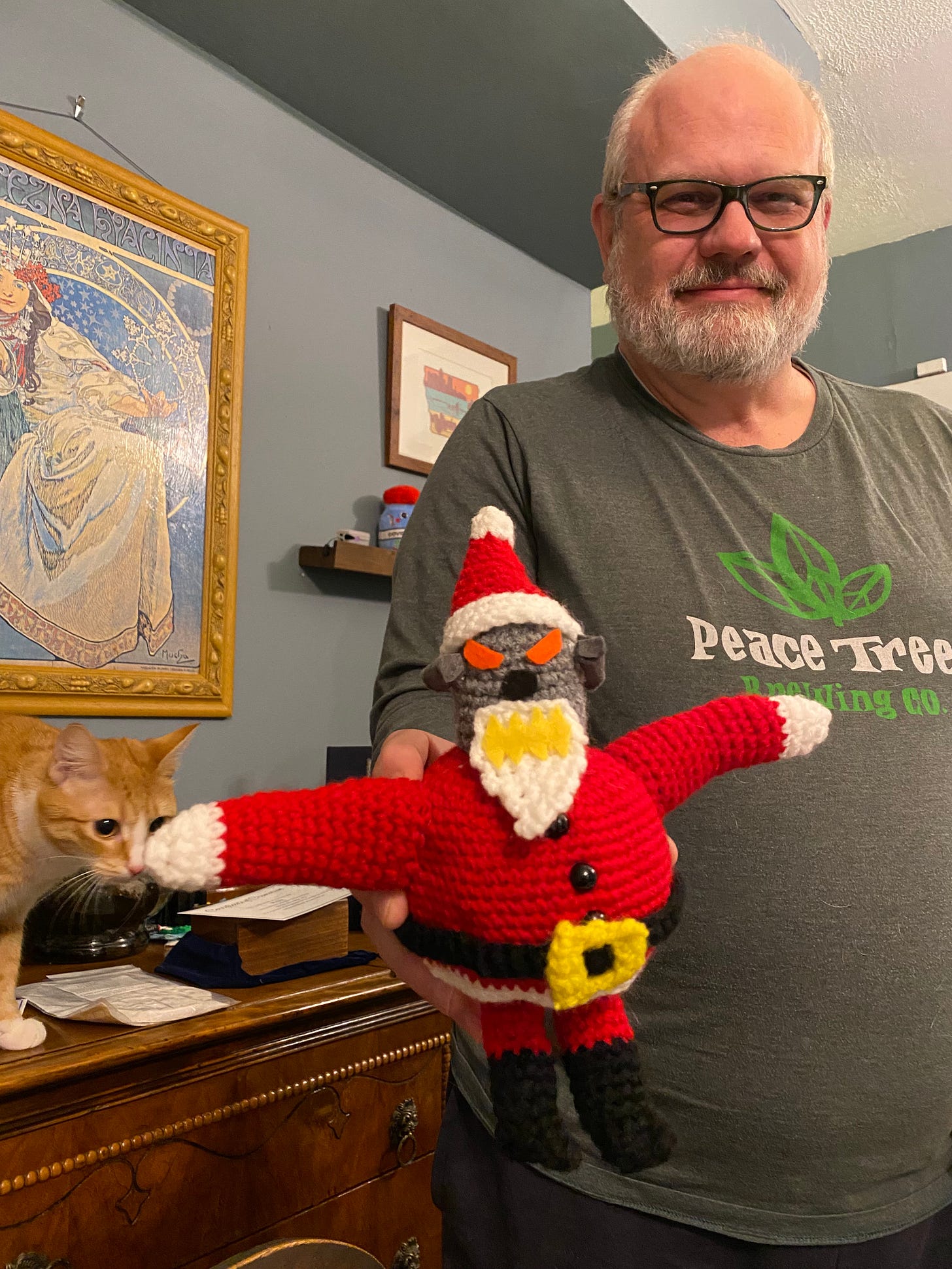
I personally didn’t celebrate Christmas or Hannukah or birthdays or anything else — at the time, my family was Jehovah’s Witnesses, and I didn’t even do the pledge of allegiance. I took a kind of pride in sitting and watching everyone else do the pledge each day, a pride in myself as someone apart. Rituals, customs, group-aligning oaths, none of these things were for me. Sure, I liked the deer with his nose aglow just fine. Charlie Brown’s Christmas had good tunes. The plastic spinning top that popped open and provided sweets, that was fun and neat.
My family was done with the Jehovah’s Witnesses before I was out of second grade, but I still didn’t do the pledge thing at school. I enjoyed the trappings of others’ holidays, but never felt they were mine. I kept my distance. Flash forward forty years, and here I am writing this today, still not completely sure how I feel about religious holidays, even the ones that might not be all that religious.
For most of my adult life, I’ve indulged in these rituals inconsistantly, and when I do, it’s in a somewhat clumsy, or hesitant, or at times even ironic, way. Unwilling to “do” the Christmas tree thing, I crafted triangular boxes and painted them green. I safety-pinned an asymmetrical aluminum foil star on top. I got people presents that were probably weird: some years extravagant, some years pathetic, some years I never managed to get things at all.
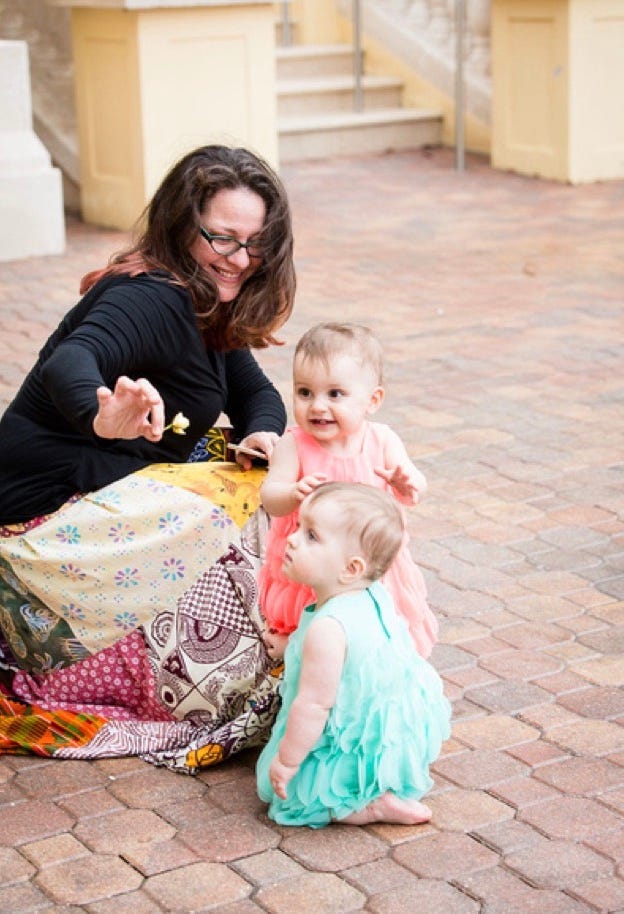
But nine years ago I became a parent, and that put a new spin on my awkwardness. My kids were getting messages from the world around them that these winter holidays were important. And so I had to figure out if there was anything authentic for me in this realm of ritual.
I’m not going to bullshit my kids. I gave them life and I owe them the truth — I may be confused about holidays, but I have full clarity on how I love my kids.
Now let’s rewind. Let’s rewind a lot. Let’s go back to my ancestors who came to this country. As far as I can tell, every ancestor I can find who came to the US came here because, wherever they were from, people were trying to kill them. Irish fleeing the English. German-speaking Romanians fleeing the emerging nationalisms of central Europe. Jews fleeing Odessa in the era of pogroms.
Here’s a joke that’s not funny. What do you get when you mix Irish with Jew? Answer: white people.
My grandmother drove me to my first ever job interview, for a job at a private-school summer camp. I was nervous and I told her so. She asked what I had to be nervous about. I said that I’d never had a job, and I didn’t know what I had to offer. She meant to give me courage by telling me, “oh nonsense, you’re a great candidate for this job…” and then she began listing my qualities. But I nearly forgot to breathe when the first quality she attributed to me was, “you’re white!”
Researching Jewish ancestors is hard. Jacobovitz is listed on his death certificate as “aka Jacobs” and Violet F. Neumann becomes Fredericka Newman and John Lolkes serves in the Army but his widow is buried as Agnes Lokes. There’s also lots of misleading details: I know thanks to 23andme that my grandmother was 100% Ashkenazi Jew. And her mother and mother’s mother both married Jewish men. Yet stories were told: first that her mother wasn’t really her parents’ child — she was a non-Jew raised by Jews, taken in. Maybe. Maybe she wasn’t theirs. Maybe she was taken in. But if she was, our genes say she was a Jewish child taken in by Jews. And the Jewish child raised by Jews who she claimed weren’t her real parents and she wasn’t actually Jewish? She divorced her Jewish husband and remarried a man named Cannon.
I wonder: the Italian1 word for “Cannon” is “Cannone.”
Dropping an “e” here, dropping an “l” there; dropping a “ovitz” over here.
Here’s a joke that’s just as not funny. What do you get if you mix Italian with Jew? Answer: more white people.
Telling this story to my Israeli friend, she tells me, “of course they pretended not to be Jewish! Because being Jewish sucks!” I mean, let’s be honest: people treat you like you’re evil. They try to kill you.
Back then, my ancestors had near-relatives in Europe who were being butchered for the mere crime of existing as a Jewish person. And the United States was not exactly an anti-Semitism-free zone. In the late 19th Century, when my ancestors came to the US, Jews, Italians, and Irish were all seen as something other than “white.” They were Working Towards Whiteness under a kind of Euro-colorism, and in a way it was a struggle for their lives.
What astonishes me is the realization that I am, by their perspective, the “beneficiary” of their efforts. These hearts-once-beating, blood-my-blood-is-of human beings were also, sometimes, scared, guilty survivors desperate to escape the stain of prejudice. They reshaped their lives, married in churches, checked boxes on government forms that were outright lies, got their children baptized. And they did so in the hopes that their children and grandchildren would be seen as “default white Americans.”
Over the course of my children’s lifetimes, just nine years, we have developed a tradition. It’s an authentic tradition to us, to our family. I started off calling it, jokingly, “Christmahannukah,” but the name is no longer a joke, and our tradition isn’t either. We make sure the kids have at least eight presents, one for each night of Hannukah, plus one for Christmas. Our Christmahannukah tree is a pencil-thin blue number with lots of very silly ornaments. We have two menorahs: one that lights regular candles with fire, and a toy one, with fake candles made of wood, which the kids can pretend to light time and again.
It’s a wonderful tradition: when the kids have been asked to open tons of presents all at once, they get overwhelmed and can’t even register everything that’s around them. One present a day is just right. Each present gets their full attention. They ask who it’s from. They say thank you. If you’re going to have a gift-giving holiday, it’s the way to go.
I just started reading a History called From Peoples into Nations, which is about the period in Europe when most of my ancestors were leaving behind everything they knew to take a chance in a new world with a new language and a big fat question mark for a future. Nationalism was emerging, then, as a force that could create countries, start wars, exterminate populations, and redefine selfhood for millions. It was a potent kind of “identity politics,” one that demanded that people of like language, religion, and culture coagulate in territories and purge that land by fire and blood of any offending “others.”
Today we deride the old “melting pot” metaphor and rightly so — people should not ooze together into fungible red-white-and-blue goo. But back then perhaps the greater worry was an over-love of one’s unique identity, an over-commitment to those like in appearance, language, habit, and belief. Homophily today draws us into silos on the internet; back then homophily assembled humans into violent mobs.
If my ancestors sought to shed the markers of their origins in that context, who can blame them?
And if I want to celebrate some of what they cast off and denied, who can blame me?
This is the true meaning of Christmahannukah: the letting go of group identities and past grievances, the cherishing of the moment, the present, and its contradictions, the welcoming of every part of ourselves.
Happy Christmahannukah!
Italian was a guess. One of my aunts tells me the Cannons were Cuban. But Cubans, as I well know because I grew up in South Florida, are just like all Americans: they all originally come from somewhere else. So who knows?

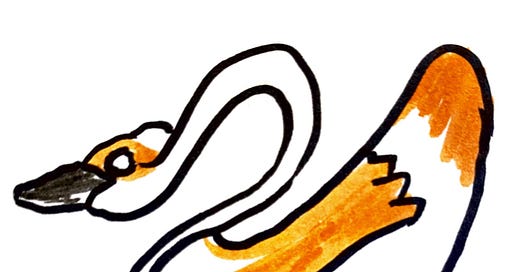



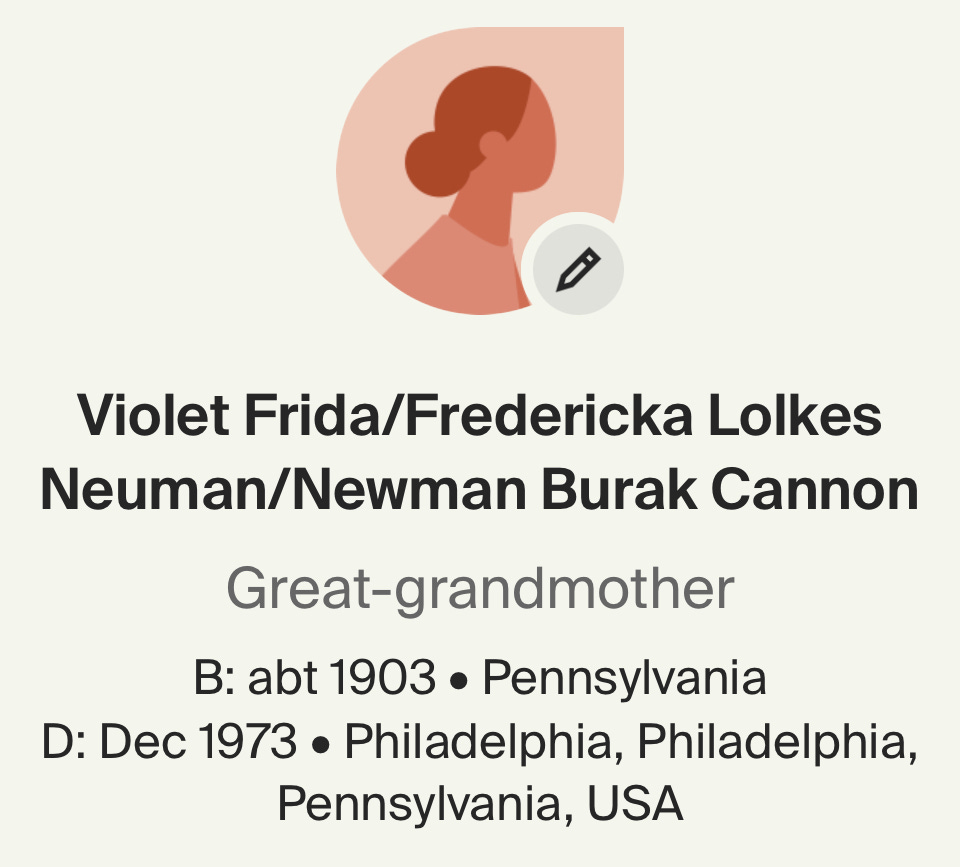

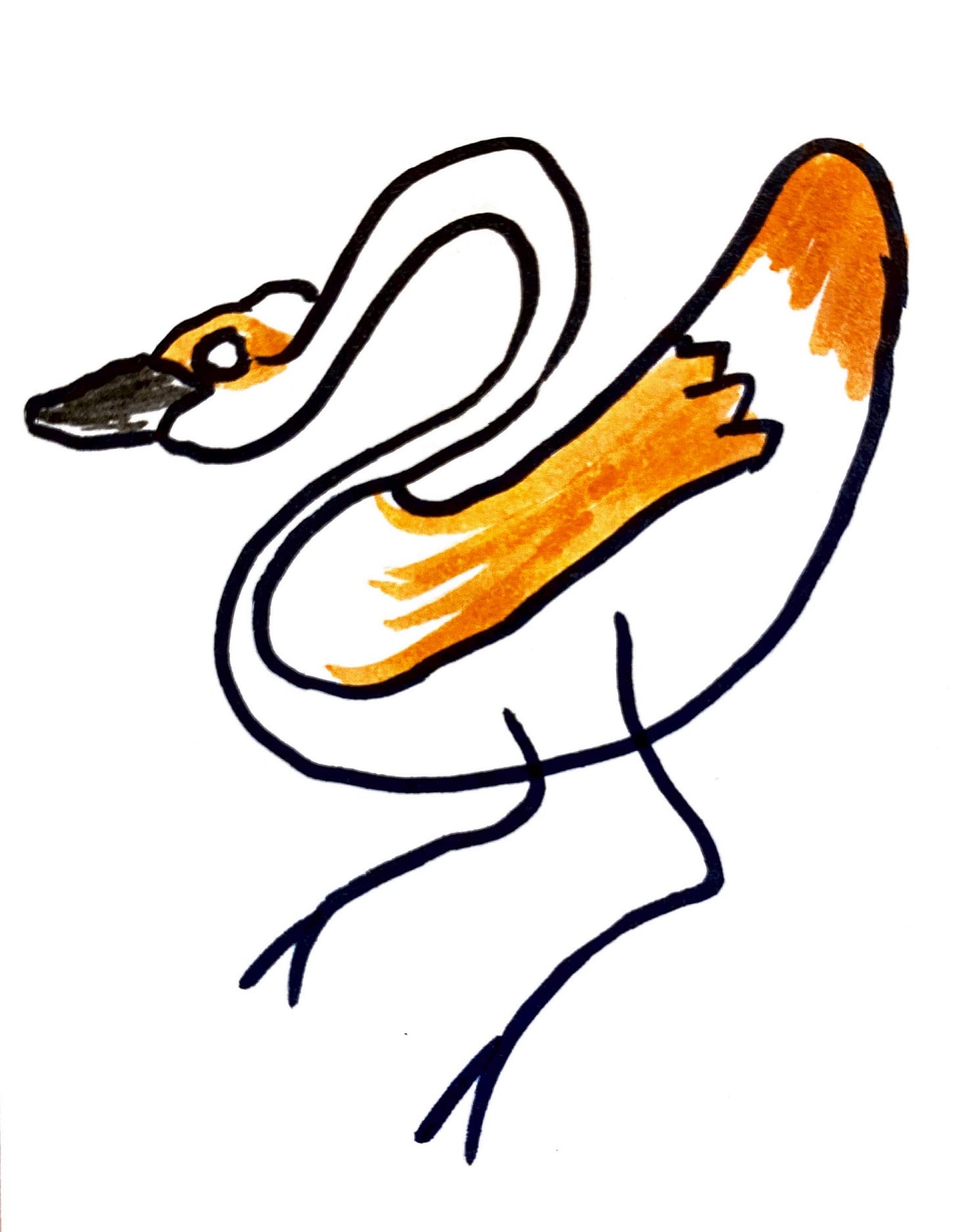
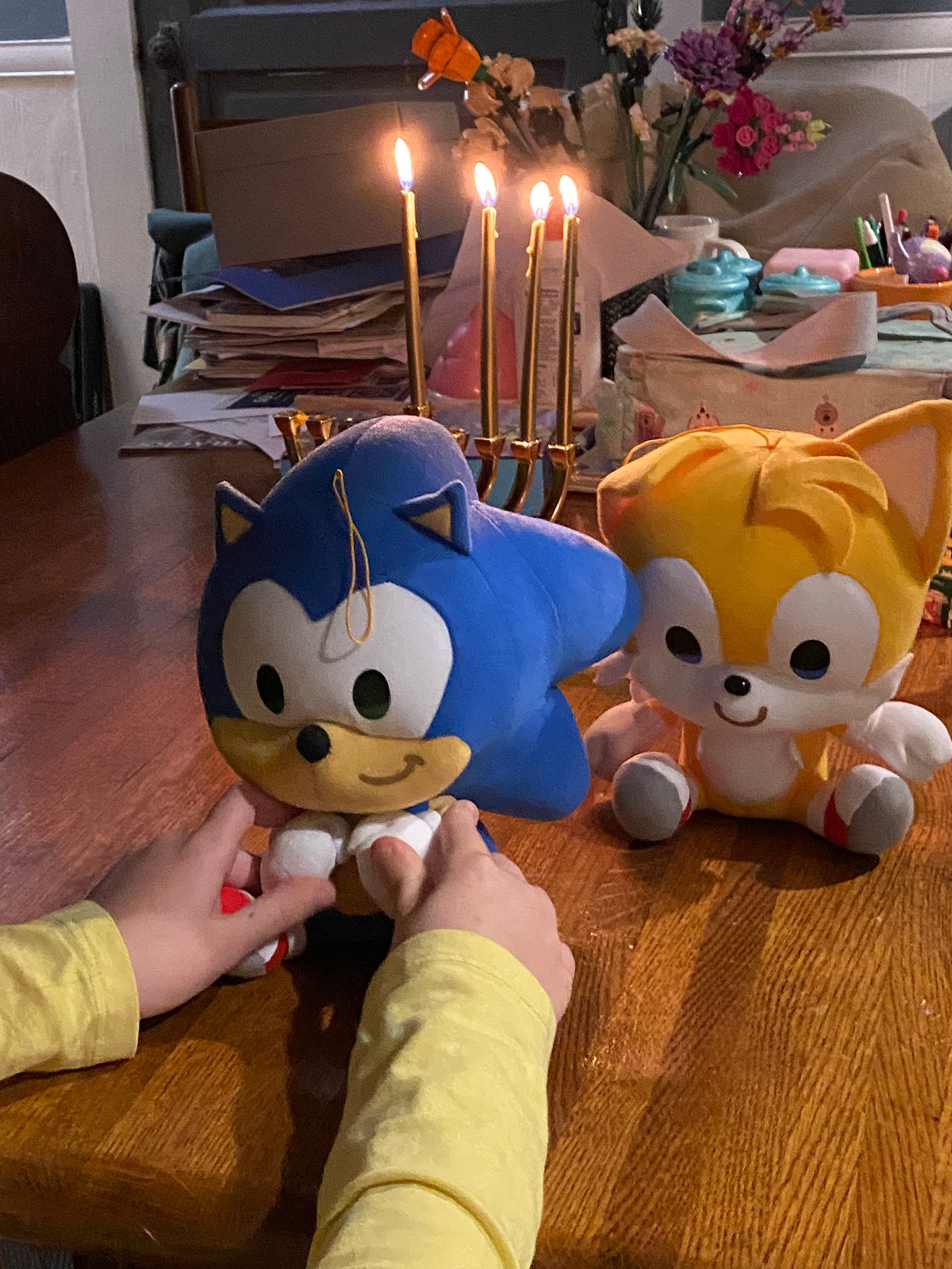
Amy, my understanding is that Alphonso Cannon was Cuban American, and had more DNA from Africa than Europe.
Mom-Mom wasn't religious and any Jewish rites she may have experienced as a young child were let go when at the age of 9 she was put into the Christian institution. And what must have been a halfhearted adoption of Christian holiday celebrations in that institution, she passed on to us children; the feeling of Christmas with half a heart.
https://www.wetheblacksheep.com/p/the-forgotten-american-masterpiece